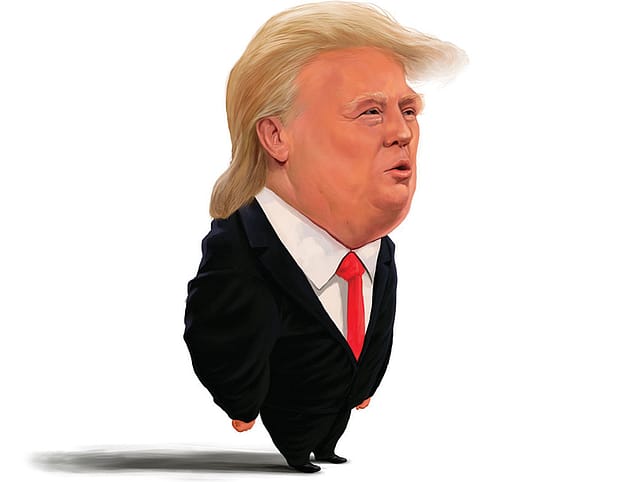Who’s Afraid of the Outsider?

THIS HAS HAPPENED before, in varying degrees of catharsis as well as catastrophe. It is the story of the usurper erupting into national consciousness, of the stranger turning his biography into the destiny of a nation in thrall, of the self-ordained liberator shattering the idyll and setting off a new argument of nirvana. There were others before Donald Trump, who may be waylaid on the long road to the White House but not before he becomes the presidential candidate of America's oldest—and the most storied—political party.
Eight years ago, around this time in America, politics was a national exclamation: O!bama. The freshman senator from Illinois, who could write like a novelist and speak like a prophet, and whose life story itself was an exceptional narrative of cultural diversity, challenged the cosy assumptions of politics-as-usual. It was a mark of his transformative power as a candidate that, on the stump, he could turn one of the oldest clichés in electoral politics—'change'—into an invocation of redemption. That campaign was pure poetry.
And a couple of years ago, in India, to cite a nearer example, the streets erupted to the liberation song of a man for whom the ultimate weapon of mass mobilisation was his own biography, the rags-to-Raisina Hill story. It was not the party apparatus that set the stage for Narendra Modi; it was his own passion for power that made him an inevitability for the party as well as the country. In a country that had mythicised the cultural difference between the power of hunger and the hunger for power, here was a politician who merged the two into one winning idea, and made himself its living example. He was the argument, and as candidate, he wanted India to win him.
2026 Forecast
09 Jan 2026 - Vol 04 | Issue 53
What to read and watch this year
That said, in style or substance, Trump has hardly anything in common with Obama or Modi. And this November, it is unlikely that I will be writing in this space about how America was won by the man who dared the Establishment and scared the op-ed pages. Unlike the other two, he is not getting any credit for coming so far, for talking his way into the heart of American politics, from the commentariat. A cursory reading of liberal punditry on Trumpism leads us to the gates of an Apocalyptic America. By now, you have already been warned about a Trump who is racist, anti-Muslim, anti-Mexican, sexist, xenophobic, nativist, demagogic, war mongering, ignorant and pure evil. Columnists are competing with each other to dazzle us with the next best deconstruction of the devil. Grandees of the Republican Establishment, led by 'losers' such as Mitt Romney, have issued a fatwa against Donald the Terrible. Do we not know about polarising pols? No one can beat Trump.
What most of them say about Trump is largely true. The man speaks unedited, unabridged; he also says that the lines he utters in the campaign theatre are mostly for stage effect and not a rehearsal for a Trump presidency. There is also no denying the reality that some of his crude exaggerations are born out of facts that are too inconvenient for the politically correct. Still, Trump on the stump is a reality show of baser political instincts.
What the liberal rage against Trump leaves unexplained is the cause of Trumpism—and its stark Americanism. The so-called 'silent majority'—in this case the angry, disillusioned White America—has always been for the outsider to win over. Trump did not parachute to middle America from Mars; he is a product of American conservatism in denial. Post Reagan, the era of George W Bush could have been the beginning of a conservative renewal, but it failed in the end to make lasting political capital out of the twin ideals of economic compassion and imperial responsibility. The arrival of Obama brought out the worst from the Republican elites. They could offer no alternative argument to a president who was a socialist at home and a vacillating pacifist abroad. They resorted to desperate negativism, which in a democratic polity is suicidal.
All the while the anxieties of the 'silent majority' lay unattended outside the world of Republican Brahminism. It was for the ambitious outsider to tap the resources of this vast constituency, as Trump continues to do with crude ingenuity. Showbiz is not the only thing that explains the cultural content—or the lack of it—of his politics. Vulgarity is not the only thing that explains the aesthetics of his theatre. Trump is an American phenomenon, in style and substance. In the New World, invariably, personal mythology is more abiding than history, and the bestselling mythology of Donald Trump is the creation of a man who dreamed bigger than the Grand Old Party of America. Bigger than the Establishment—and that is a familiar story of the outsider everywhere.
